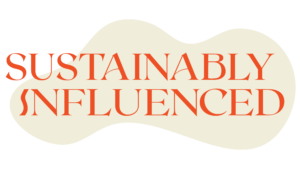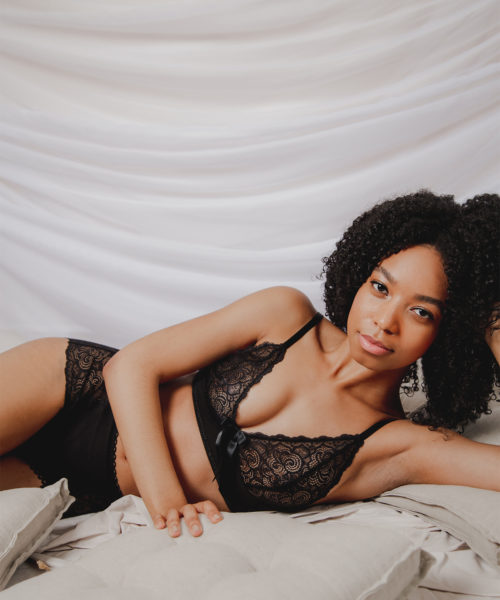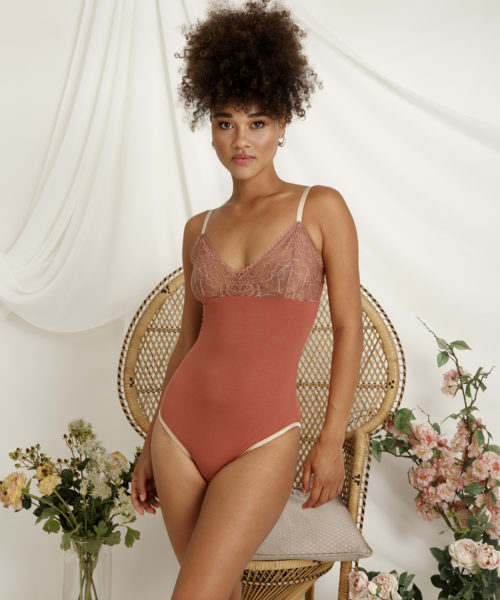In Conversation With...Ayten Roberts, Founder of Ayten Gasson
Bianca Foley
Launched in 2005, Ayten Gasson Lingerie has become known for its firm commitment to ethical manufacturing and its use of sustainable fabrics. Today we are speaking with the brand founder and designer Ayten Roberts. Ayten is dedicated to supporting as many independent and ethical companies as possible, from lace mills to printers. Her pieces are beautiful and very much on trend this season. Each item is handcrafted in small batches in their Brighton studio.
Ayten, your family’s experience with fast fashion influenced your decision to make Ayten Gasson a sustainable label. Can you elaborate on how this personal experience shaped your mission and approach to sustainability in the fashion industry?
Both my parents are immigrants, having come over from Northern Cyprus during the Cyprus Conflict. My mother was 12 when she came over with her family and there were not many career options for her when she left school. Both my grandmother and my mum ended up working in the garment industry. My grandmother worked in a factory which was located at the end of my road in Archway, North London and I would visit her after school. I was fascinated by how these garments were made and loved watching the pieces pass through the production line, being cut, sewn, ironed and packed. During this time my mother was working from home, sewing on an industrial Singer machine in the spare room. I would also sit with her earning my pocket money by cutting the cotton threads. It was only when I got older that I started to understand how my grandmother and mother were being exploited as they were earning below minimum wage making fast fashion pieces for the high street. I remember my mother once telling me she would receive 20p a piece for a shirt I would later see in Topshop. When I started the label, I knew I would never knowingly exploit any workforce, which means I always have to ask questions about the welfare of those who contribute to my business.
The use of eco-friendly materials and practices is a central aspect of Ayten Gasson’s ethos. Could you share some specific examples of how your brand has evolved in terms of sustainability, from the materials used to production methods, since its inception in 2005?
When I initially launched the label, sustainability was an obscure concept. There wasn’t much discussion about it and it was often dismissed as a marketing ploy. I would research ethical fabrics and attend fabric trade shows, but found sourcing these materials challenging. Fortunately, I stumbled upon Cluny Lace, one of the few remaining lace manufacturers in the UK. They have upheld a tradition of producing cotton laces in their Derbyshire factory since 1845, and I have loved working with them over the years. For a while, I was only able to use conventional silk alongside the locally manufactured Cluny Lace, occasionally incorporating peace silk or hemp if and when I was able to find a supplier.
As the internet became more prevalent, sourcing these fabrics has become much easier. There are fabric shows, such as the Future Fabrics Expo in London, dedicated to showcasing certified, sustainable materials. There is also a wealth of resources online and companies that contribute to the business, such as packaging companies introducing more ethical options to choose from. Our latest collection features organic silk, organic bamboo, recycled cotton and oeko-tex certified laces. My production methods are now exactly the same as when I first started the business. I still use the second-hand Brother sewing machine my mother bought me when I launched the label, although I have added to the collection since then!
Ayten Gasson has been offering sustainable luxury lingerie and nightwear for 18 years. How do you see the market and consumer preferences evolving in the realm of sustainable fashion, and how has Ayten Gasson adapted to these changes over the years?
There has definitely been an increase in people wanting more transparency from their fashion brands. People have a better understanding of what sustainability is and why it is so important. The press has embraced this too. There are now more features, like Country & Townhouse’s Sustainable Luxury List, GQ’s 10 best sustainable brands, and The Guardian’s 2020 Ethical Undies feature (which we are listed in). I’ve also found that more and more of my customers are looking for ethical options. I was recently contacted by a customer on Instagram who asked which of my designs were 100% vegan. I was able to give the details of the base fabrics and laces and I was able to assure her that the listed pieces were 100% vegan and no animal by-products were used in the manufacturing or dieing process. The only thing I couldn’t guarantee was the dyes used on the elastic trim as this was bought as deadstock and my supplier couldn’t provide this piece of information. I’m proud to be able to offer a range of sustainable fabrics and be able to discuss the ethical properties of each with my customers. It would be easy to label a piece as ‘Ethical’ or ‘Sustainable’ but you need to have the facts and more importantly, the certificates, to prove that you are not greenwashing your brand.
Your recent “Bella” collection features Organic Bamboo Silk and other sustainable fabrics. Can you tell us more about the challenges and benefits of sourcing and incorporating these eco-friendly materials into your designs, as well as your vision for the future of sustainable fashion materials?
As I mentioned, I no longer have the same barriers I faced when I first launched the label. It is much easier to source sustainable materials and I feel I have developed a strong working relationship with my fabric suppliers. One of the benefits of having such a good relationship is that they contact me to discuss new fabrics they are working on and new developments. Plus, I have early access to new colours and designs that are introduced into their range.
With the increased media coverage and general support for using sustainable materials, I believe it will only get easier to source and for customers to be secure in the knowledge that they are buying sustainable fashion.
It’s impressive that you actively participate in local sustainability events and fashion talks. Could you share some key takeaways or insights from your experiences speaking at events like Brighton’s Sustainable Fashion Week and the Circular Economy Panel? How do these engagements inform your brand’s sustainability initiatives?
I am honoured to be able to take part in these sustainable events as I feel that this discussion is incredibly important. Sharing my firsthand experience of the exploitative nature of fast fashion has been empowering and motivates me to make sure no one is exploited in my supply chain. This isn’t easy and is an ongoing project, but these engagements allow me the opportunity to step back and look at the label and assess what else I can do to be more sustainable. It is also inspiring to hear other company’s stories, their initiatives, and what motivates them. I feel as though there is a lot of support within the sustainable community.
Ayten Gasson initially stocked lingerie with small boutiques and department stores before transitioning to a completely online business. What prompted this shift, and how has it impacted the brand’s sustainability efforts and customer engagement?
When I first launched the label, my sole avenue for sales was through retail stores. Selling directly to the public was unattainable as there were no online shopping options available at that time Depending on these stores to retail my designs meant producing large quantities and accumulating excess stock, leading to unnecessary waste. Following the 2008 recession, I found more of my stockists wanted to work on a sale or return basis, which means any unsold stock would be returned back to me. This made me re-evaluate my business model and look at ways to connect directly with my customers. In 2016 I opened my first boutique in Brighton. Running a shop was challenging but very rewarding. My shop was slightly different to a lot of brick-and-mortar businesses as all our pieces were made on the shop floor. This meant our customers could watch us design, pattern cut and sew all our collections. I created a space which allowed our customers to engage with us and our manufacturing process was incredibly transparent. But this did mean that we couldn’t get on with the designing or sewing. We were frequently stopped and asked to explain our process. In the end, I found I was neglecting the label and focusing on the day-to-day running of the shop. That is why I decided to move to a private studio. Unfortunately, I am not in a position to do both as the cost of running a shop is too high, especially when you have the daily cost of running a studio. Now that I am producing all my designs in the studio, I can limit our production runs so only a few items are made at a time and much of our stock is made to order. This means once an order comes in, I can make it and send it to the customer, usually within 4 working days. This means we can reduce the amount of fabric we need to purchase at one time. As everything is cut and made in the studio, I can make sure I use as much of the fabric as possible. Eye masks and bra panels can be cut from sections left from larger pattern pieces, such as our camisoles and knickers. We are then left with scraps that are too small to use, which are donated to local schools and community centres.
Ayten Gasson has a loyal and ever-expanding customer base. Can you share some of the strategies or initiatives that have helped you maintain and grow this dedicated following in the luxury sustainable silkwear market?
I don’t rely on specific strategies to expand my customer base. Instead, through years of experience, I’ve learned the importance of listening to my customers and understanding what they are looking for. Customer service has always been important to me and I value any feedback I receive while looking at ways to improve what we offer. If a customer emails to inquire about the fabric content of one of our pieces, it indicates that I haven’t provided sufficient information on my website, so that is something I have to improve. It’s an ongoing journey, and it’s the support and motivation from my customers that continually drive me forward.
Share This Story
Related Posts

How Circular Threads Is Transforming Preloved South Asian Fashion For Women
Discover how Circular Threads is revolutionising preloved South Asian fashion for women in the UK. Learn about the sustainable fashion movement led by Anoli Mehta and join a community committed to style and sustainability.

Revolutionise Your Wardrobe Using Tiffanie Darke’s ‘Rule of 5’ for Sustainable Fashion
Discover Tiffanie Darke’s groundbreaking “Rule of 5” and transform your mindset on sustainable shopping. Explore the impact, challenges, and practical tips for adhering to this directive, revolutionizing your approach to fashion.
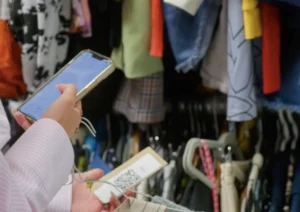
Hudi Charin’s TikTok Journey, Reshaping Fashion Trends and Confronting Overconsumption
TikTok has emerged as a powerful platform for influencers to share their passions and drive meaningful conversations. One such advocate for sustainable fashion is Hudi Charin, whose TikTok journey on @thethriftythinker is reshaping perceptions of overconsumption.
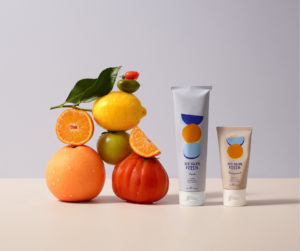
Beauty Interview with Danielle Close, My Skin Feels Founder
Beauty Editor Alice Hartwell speaks to My Skin Feels’ Founder Danielle Close on the benefits of food waste in skincare – for our skin and the planet!
